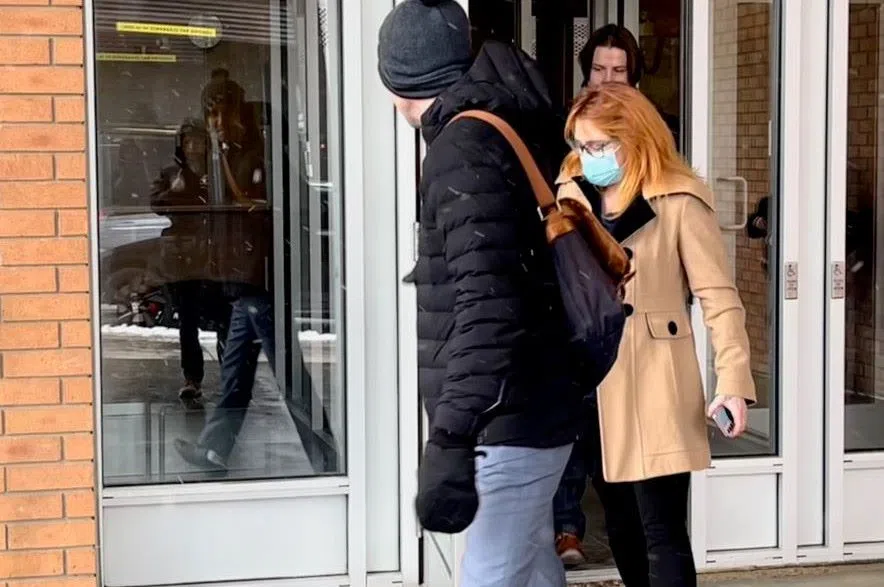A 29-year-old woman charged with driving while high and causing the death of a nine-year-old Saskatoon girl took the stand in her defence Wednesday in Saskatoon Provincial Court.
Bayleigh Maurice died on Sept. 9, 2021 while riding her scooter to school along 33rd Street West. She was in a marked crosswalk when she was hit by a pickup truck and killed.
Much of the testimony during Taylor Kennedy’s appearance Wednesday was contained in a voir dire, or trial within a trial. The judge in the case must determine whether statements Kennedy made to Saskatoon police – before she was arrested and read her Charter rights – about consuming cannabis and micro-dosing magic mushrooms the day before Maurice was killed can be admitted into the trial.
READ MORE:
- ‘The family is still in pain:’ Walk marks two years since nine-year-old killed
- Police testimony continues at trial for woman charged in death of Baeleigh Maurice
During the voir dire, Thomas Hynes, Kennedy’s lawyer, asked her whether her admission of consuming drugs to Saskatoon police was true. She answered it was.
Hynes also asked her why she thought she had to admit to using drugs. Kennedy answered that she thought it was the law, and that she had to do so.
Referring to a crash she had been in Regina in 2014 or 2015, Kennedy testified the vehicle she’d been driving had been rear-ended by a former high school acquaintance, but there had been no apparent vehicle damage.
Her mother told her “it was the law” to report the collision to police, something Carla Kennedy also confirmed after her daughter’s testimony.
Taylor Kennedy testified that because she “was hit and she ran,” she was found at fault for the collision in traffic court.
Under cross-examination Wednesday by Crown prosecutor Michael Pilon, Kennedy was asked repeatedly about her understanding about when she was asked if she wanted to call a lawyer, and whether she recalled even requesting to contact one.
“I believed I had,” she said.
Pilon also suggested that police never stopped Kennedy from speaking to her mother, never prevented her from answering her telephone — which was in her possession the entire time — and did not stop her from searching for or contacting any lawyer.
The 29-year-old also testified that she suffers several mental health challenges including depression, anxiety, bipolar disorder, and personality disorder.
Hynes is calling for the charge of impaired driving while exceeding the prescribed blood-drug concentration of THC causing the death of Maurice to be dropped, citing a violation of Kennedy’s Charter rights.
Outside the courthouse, Hynes said he likens it to a kind of “domino” effect, with the question of whether Kennedy’s statements should be admitted as evidence and whether police have the right to demand roadside screening tests.
“The constitutional challenge is about a section of the Criminal Code that says compelled statements can be used to support a roadside screening demand, or a breath demand, or a blood demand or something,” Hynes said. “We’re saying that section of the Criminal Code is unconstitutional.
“We’re also saying the police, separately, violated her rights in a bunch of different ways that when you add everything up, you get the statement of the case gets thrown out.”
Hynes also said it was Kennedy’s decision to testify.
“In an application like this, she has to establish certain things … She has to establish on a balance of probabilities that her statements were, in fact, compelled,” he explained.
Earlier in the day, the Crown wrapped up its case with testimony from Staff Sgt. Devon Racicot of the Saskatoon police. He testified to the number of officers who’d had either field sobriety training or Drug Recognition Enforcement (DRE) training, or who’d been trained in obtaining oral fluids.
Racicot told the court that as of September 2021, there were 479 Saskatoon police officers, 57 of whom had field sobriety training and 21 who had DRE training. On the day Maurice was killed, four officers were on shift who had completed their field sobriety training, while two officers with DRE training were also on duty.
Court heard that some of the training for the various courses needed to be completed outside of the province, including the U.S., Vancouver, or Ottawa, and that during 2020 and 2021, courses had been suspended because of the COVID pandemic.
The SPS did not have control over the intake numbers for the courses, but could put forward any number of officers who wanted to take the specialized training.
Hynes said it’s expected the judge will hear some preliminary arguments later this week to find out whether the constitutional challenge can move ahead, and the defence filing supporting material for a Jordan application, alleging the trial has not taken place within a reasonable amount of time.











